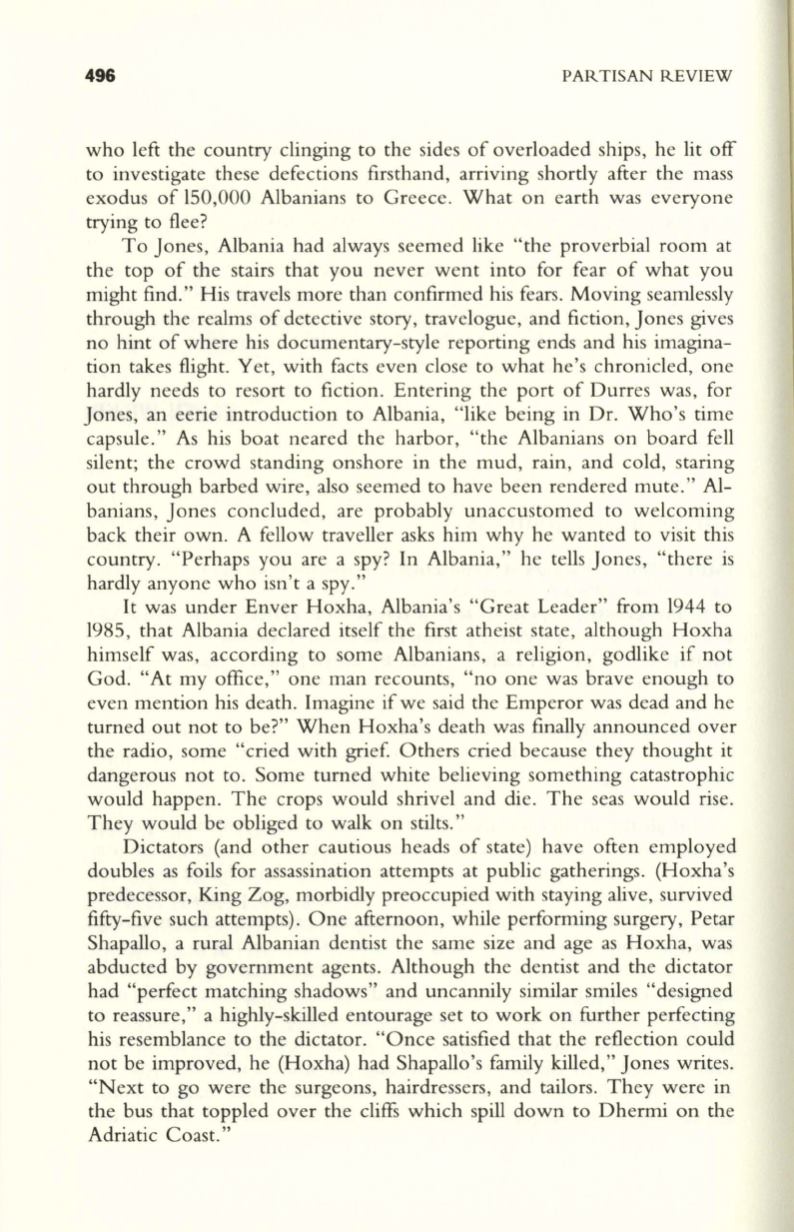
496
PARTISAN REVIEW
who left the country clinging to the sides of overloaded ships, he lit off
to investigate these defections firsthand, arriving shortly after the mass
exodus of 150,000 Albanians to Greece. What on earth was everyone
trying to flee?
To Jones, Albania had always seemed like "the proverbial room at
the top of the stairs that you never went into for fear of what you
might find." His travels more than confirmed his fears. Moving seamlessly
through the realms of detective story, travelogue, and fiction, Jones gives
no hint of where his documentary-style reporting ends and his imagina–
tion takes flight. Yet, with facts even close to what he's chronicled, one
hardly needs to resort to fiction. Entering the port of Durres was, for
Jones, an eerie introduction to Albania, "like being in Dr. Who's time
capsule." As his boat neared the harbor, "the Albanians on board fell
silent; the crowd standing onshore in the mud, rain, and cold, staring
out through barbed wire, also seemed to have been rendered mute." Al–
banians, Jones concluded, are probably unaccustomed to welcoming
back their own . A fellow traveller asks him why he wanted to visit this
country. "Perhaps you are a spy? In Albania," he tells Jones, "there is
hardly anyone who isn't a spy."
It was under Enver Hoxha, Albania's "Great Leader" from 1944 to
1985, that Albania declared itself the first atheist state, although Hoxha
himself was, according to some Albanians, a religion, godlike if not
God. "At my office," one man recounts, "no one was brave enough to
even mention his death. Imagine if we said the Emperor was dead and he
turned out not to be?" When Hoxha's death was finally announced over
the radio, some "cried with grief Others cried because they thought it
dangerous not to. Some turned white believing something catastrophic
would happen. The crops would shrivel and die. The seas would rise.
They would be obliged to walk on stilts."
Dictators (and other cautious heads of state) have often employed
doubles as foils for assassination attempts at public gatherings. (Hoxha's
predecessor, King Zog, morbidly preoccupied with staying alive, survived
fifty-five such attempts). One afternoon, while performing surgery, Petar
Shapallo, a rural Albanian dentist the same size and age as Hoxha, was
abducted by government agents. Although the dentist and the dictator
had "perfect matching shadows" and uncannily similar smiles "designed
to reassure," a highly-skilled entourage set to work on further perfecting
his resemblance to the dictator. "Once satisfied that the reflection could
not be improved, he (Hoxha) had Shapallo's family killed," Jones writes.
"Next to go were the surgeons, hairdressers, and tailors. They were in
the bus that toppled over the cliffs which spill down to Dhermi on the
Adriatic Coast."


